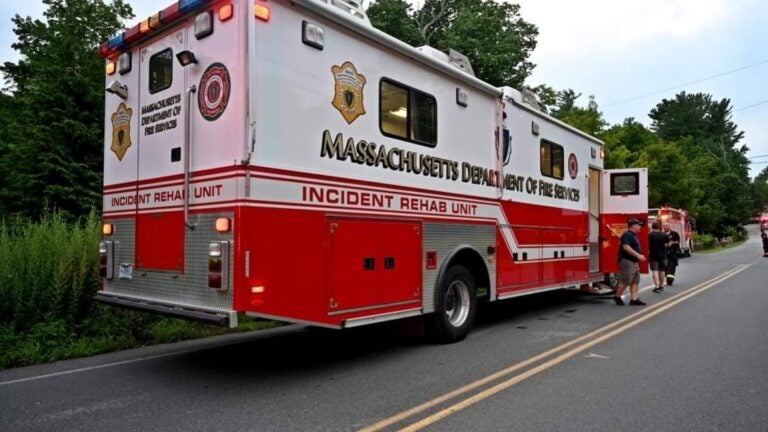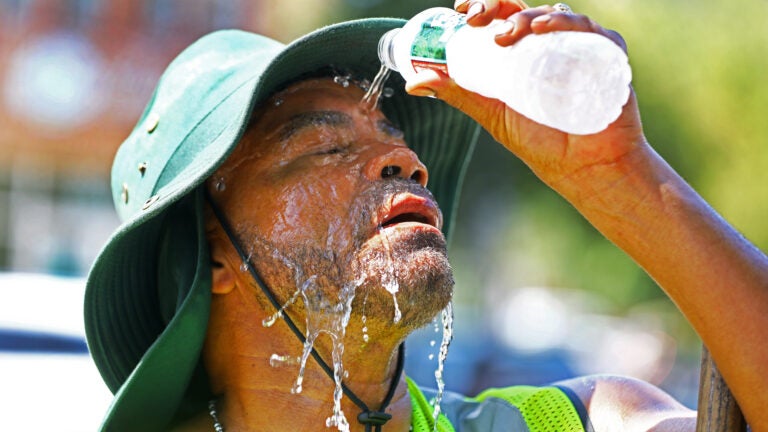Newsletter Signup
Stay up to date on all the latest news from Boston.com

As a brutal drought persists across Massachusetts, environmental experts urge the public to heed local water restrictions amid an uptick in wildfires.
Fifty-seven percent of Massachusetts is now in what the U.S. drought monitor considers a severe drought, up from 44 percent last week, and 26 percent the week prior.
“It’s more severe than a normal dry summer. It’s 3 out of 4; the next level is an emergency level,” says Vandana Rao, the director of Water Policy for the Massachusetts Executive Office of Energy and Environmental Affairs (EOEEA). “It is pretty critical in the Northeast and Central region of the state.”
Parts of the state were in a heat emergency on Thursday and Friday, with heat indexes of over 100 degrees. Boston surpassed its heat record for Thursday with a temperature of 98 degrees, according to the National Weather Service (NWS). The previous record for that day, set on Aug. 4, 1926, was 96 degrees.
A record high temperature was set in Boston and tied in Hartford today. A heat advisory remains in effect until 8pm Friday. Hot and humid conditions will continue through the weekend. #MAWX #RIWX #CTWX pic.twitter.com/QcXN5Bojlt
— NWS Boston (@NWSBoston) August 4, 2022
The heat and dryness have led to more wildfires this season — 159 in July alone, according to the Department of Conservation and Recreation.
“We’ve definitely seen an uptick in fire activity,” said DCR Chief Fire Warden Dave Celino. “That’s a pretty steep number for us.”
The best thing the public can do to get ahead of the risk of wildfires is to conserve water, especially when it comes to outdoor watering — regardless of whether they have a private well or use municipal water. As of Saturday, at least 147 Massachusetts cities and towns have put outdoor water use restrictions in place.
“To put out fires, we need water. If people are using a lot of water for grass, it’s not enough to put out a fire,” says Rao. “Having that water for fire protection is critically important.”

According to the state’s Department of Fire Services (DFS), about 40 percent of Massachusetts homes are in areas at risk of brush and wildland fires. Not only does drought allow fires to start more easily and spread more rapidly, but it also causes them to burn deeper into the ground, making them harder to contain and extinguish.
“We’re seeing it really worsen every week lately. Fires are easily burning 10 to 15 inches into the ground,” says Celino. Firefighters can’t fully suppress such fires, and in some cases, they can’t be fully extinguished until there is a drenching rainfall.
More than 98 percent of Massachusetts wildfires are caused by human activity. The most common cause is campfires. Celino advises people to fully extinguish a campfire by drowning it with water and mixing it into mud that’s cold to the touch.
Grilling, smoking, out-of-season open burning, and illegal fireworks can also cause wildfires, according to DCF. Even power equipment like lawnmowers or ATVs can ignite leaves and debris due to the heat of their engines and exhausts.
Ongoing #Drought conditions are raising the fire risk across the state. About 40% of Massachusetts homes are in Wildland-Urban Interface or Intermix zones, so #WildlandFires can threaten homes just as house fires can spread to wildlands. Be fire-safe indoors and out! pic.twitter.com/oqPeCz2kGt
— Massachusetts Department of Fire Services (@MassDFS) August 2, 2022
Looking ahead, Massachusetts needs several months of above-normal rainfall to completely come out of this drought and increase the groundwater level.
“It will take some time,” says Rao. “It’s going to be a few months for sure.”
Despite the noticeable lack of rain, this summer’s drought hasn’t yet beaten out the drought of 2016. But as Rao notes, there’s still over a month left of summer, and there’s no telling how much — or little — rain is in store.
“Honestly, we don’t know how much longer the drought will last or how much more severe it will get before it improves,” says Rao. “We all need to be practical and protective of water supply resources. Use only what is needed. Minimize or eliminate outdoor watering for non-essential purposes. Just use it for basic needs.”
Stay up to date on all the latest news from Boston.com

Stay up to date with everything Boston. Receive the latest news and breaking updates, straight from our newsroom to your inbox.
Conversation
This discussion has ended. Please join elsewhere on Boston.com